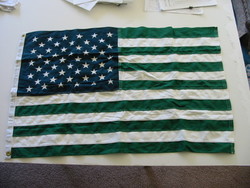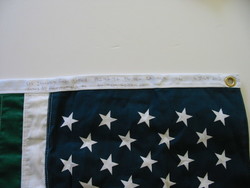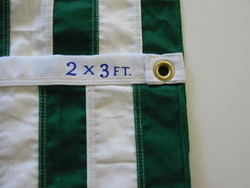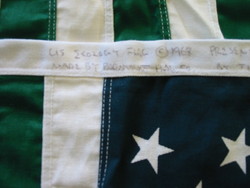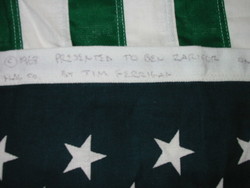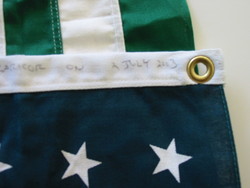U.S. style Ecology Flag from San Francisco - Circa 1968.
This ecology flag was the first style ecology flag and used in the 1960s. This was prior to the popularization of the theta style ecology flags, now commonly accepted as the Ecology Flags. The original flags were made as a response to the nascent counter culture movement then prevalent in the San Francisco Bay Area, especially in the cities of San Francisco and Berkeley, California.
According to the Flag Research Center's 'The Flag Bulletin' #155:
"This flag is one of a number of ecology flags developed in the United States in the late 1960s and early 1970s. The first such flag was simply the Stars and Stripes with its blue replaced by dark green and its red by light green. That design, made by the Paramount Flag Company of San Francisco in August 1967, flew at the famous Peoples Park incident at the University of California in Berkeley. The colors symbolized the pure air and green land that was America once and that can be ours again if we take the action necessary to recover our heritage.
On 25 October 1969 political cartoonist Ron Cobb developed a symbol for the ecological movement based on an oval and circle and on the initial letters of the words environment and organism. The resulting design, which he put in the public domain, resembled the Greek letter theta. Look magazine (21 April 1970) widely popularized the theta symbol, which it associated with the Greek word Thanatos (death) in light of human threats to the environment and atmosphere of the earth.
Look incorporated the theta in chartreuse (later often rendered as yellow or white) in a flag with green and white horizontal stripes and a green canton. Other variations were subsequently developed, but Looks Ecology Flag remains the most popular design expressing environmental concerns."
This was actually one of a series of flags made by the Paramount Flag Company starting in the late 1960's and continuing until the sale of the company to Doublet flag company in 1989. This Ecology flag is the first patterned ecology flags ever made, by utilizing the existing screens for the production of United States star fields, but with Dartmouth Green instead of Old Glory blue. The red stripes were replaced by Irish Green stripes, resulting in, literally, a "green" US Flag. Eventually Paramount switched to the standardized "theta" style ecology flags, but continued to sell the Ecology US until stocks were diminished. Paramount also made as part of this US Style series, a Love Flag, which was a US style flag with a heart in the canton instead of the stars. They were offered in two styles, plain white and a red and white heart; and a Peace flag was similar but replaced the heart with the so called "Peace symbol". The Ecology and Peace flags remained popular, the Love flag less so.
Although Paramount was simply responding to demand, and utilizing pre-existing screens kept costs down, the design has been subsequently interpreted as: the green and white colors symbolize the pure air and the green land. The oval with a line through the middle is a stylized symbol combining the initial letters in the words environment and organism. This stylized symbol also resembles the Greek letter theta which is associated with the Greek word thanatos (death). This symbol, therefore, implies mankinds threat to the environment.
Paramount flags made during the 1960's may be identified by the company's practice of placing the labels on the reverse of the heading. In the mid 1970's they started placing all their markings on the obverse heading. This was the case until the 1990's when they moved their markings to the lower obverse.
Provenance: The flag was given as a gift to Ben Zaricor by James (Jim) Ferrigan of Reno, Nevada, on 2-July-2003 at the Presidio of San Francisco. Information about the flag was supplied by Mr. Ferrigan. BZ
Deaccessed Heritage Auctions - 13 November 2023 - Auction 6276
ZFC Significant Flag
Item is Framed
Souces:
Ecology Flag, Wikipedia, 8 November 2011, from: http://flagcollection.com/itemdetails.php?CollectionItem_ID=1160
Ron Cobb, Wikipedia, 8 November 2011, from:
http://en.wikipedia.org/wiki/Ron_Cobb
Ecology Flags (U.S.), Flags of the World, 8 November 2011, from: http://www.crwflags.com/fotw/flags/us_eco.html
53 flag questions from readers (Ecology Flag), The Flag Bulletin: The International Journal of Vexillology, Winchester, The Flag Research Center, 1993.
The Flag in the Sixties, Smithsonian, 8 November 2011, from: http://americanhistory.si.edu/starspangledbanner/the-flag-in-the-sixties.aspx
Image Credits:
Zaricor Flag Collection


